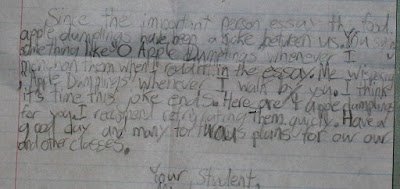The other day a student showed me her multiple, color-coordinated, duct-tape bags (and a folder) that even matched her outfit–and she gave me a flower she’d made:

Amputation
A student asked to see the school nurse today for a rash on his arm. He was back soon, with a smiley-faced note: “Unknown tubular skin disturbance. Possible amputation required.”
“Class,” I said soberly, putting down The Wind in the Willows. “We have a problem we need to deal with. We need to amputate C’s arm. C, come up here and lie down on a desk.”
He came up and lay down on the floor.
“I need a sharp cutting instr…. Oh, here are my keys and my nail clippers,” I said. The rest of the students began flocking forward.
“You hold the keys here,” I said to another student, placing them in his hand right above C’s arm. “I’ll push them down with my foot.”
The excitement that tensed the air as I lifted my foot over the keys was answered, when I then merely stepped onto the floor beside the arm and reached down to retrieve my keys, with chuckled groans of convincingly real disappointment.
Showing My Students I Care (And Other Short Conversations from Today)
Immediately after I rearranged the seating assignments for three excessively talkative students, another excessive talker pointed towards one of his talkative friends and asked if he could be moved “over there.”
“No, but thanks for asking,” I said quite kindly.
“Oh, you’re welcome,” he replied.
***
“Please speak into the microphone,” I said to a student who had approached my desk.
“That’s not a microphone. That’s a pencil,” she said.
“No, it’s a microphone. Talk straight into it, please.”
“I will not. It’s a pencil.”
“Okay then. What do you need?”
“I was wondering–“
“What? I can’t hear you without the microphone.”
“I WAS WONDERING–“
“I STILL CAN’T HEAR YOU. PLEASE USE THE MICROPHONE.”
***
As I was sitting at my desk and students were “walking the circle” (“It’s a square,” they keep insisting) to get their blood moving and pick up a copy of The Wind in the Willows, one student came up to me and lightly touched the top of my head.
“See, he’s not totally bald,” she said to her classmates. “He has some hair up there.”
Apple Dumplings
Last Christmas when one of my instantly favorited students brought me a shoofly pie she had made just for me, I was, quite needless to say, tickled.
When a student this year showed me the rough draft of his essay about an important person (he chose as his subject his mom–an eighth grade teacher in my school–who makes him apple dumplings), I moaned in mock agony that I wasn’t eating one of the treats right then.
When he showed me the final copy of his essay, I again put on a show of excessive craving. What could he do but begin to taunt me by saying “apple dumplings” in response to my “good afternoon” or just whenever?
And then today, before school, he brought me this note attached to a covered aluminum pie plate (click on each picture to enlarge):



If you didn’t catch it, the last line of the letter reads, “Have a good day and many torturous plans for our our and other classes.”

Expressing Yourself
It may have started with Madonna expressing herself in the 80’s. Then web 2.0 really picked up the pace. Now, even middle school yearbook photos are now all about “expressing yourself” with “popular choices” including Photoshop acne removal.But as Paul Simon sings, “I’m tired, tired–anyone care what I say? No.”
David Lyons recently wrote in Newsweek that Twitter–“the microblogging site that lets you broadcast 140-character messages to anyone who chooses to become your ‘follower'”–has succeeded not in spite of but precisely because of its stupidity: “One recent study concluded that 40 percent of the messages are ‘pointless babble.'”
And there’s blogging, too, of course, which has brought many wonders of my world to light, so I won’t complain one bit about it.
In this climate, then, it’s a relief that N has already learned to express herself in down-to-earth, effectively meaningful ways. Remember Maizee, that lovable dog that followed us home once (well, more than once)? Last week she showed up by our side as we took another walk. Immediately, N, perched there in her backpack, said, “Beat it! Go!”
And Maizee went.
Motivation
It was a beginning-of-the-school-year, budget-crunched, Get-in-the-mood, teachers! pop psychology of nothingness event: local motivational speakers.
I’d heard the husband “entertain” before at a company meeting, an appearance during which he alluded to my dour expression; this time he told many of the same jokes but was also joined by his wife.
And they won me over. Well, she did, anyway. Especially at the very end, when she talked about her ongoing battle with a cancer that, I learned just the other day, is now unstoppable.
(Speaking of cancer, one of the activities they led involved writing a famous person’s name on a name tag, and putting the tag on someone else’s back. That person, then, had to figure out who was on the tag by asking only yes or no questions. I turned out to be Marilyn Monroe–got it in three questions, with the help of a hint–and the colleague who wore my tag was Lance Armstrong. “Am I a male?” she asked another teacher. Then, “Am I an athlete?” And then, “Does my sport involve a ball?” That did it.)
Three highlights from the speakers and the discussions they organized:
…Everyone has a story–to write or be written. Each of our lives is a story.
…Each person needs to ask, “Who am I? Why do I matter?”
…Middle school teachers are more concerned with students than with content.Speaking of budget-crunching, the bulk of another kick-off in-service for all of the county’s secondary English teachers was led by a central office student intern who hasn’t yet student taught. That afternoon’s only redemption was the bittersweet irony of my ride: I carpooled with the coordinator of last year’s “our school goes green” campaign…in her huge SUV.
Breaking the Bad Surf News
One of my English-teaching colleagues has a cousin with a published work of surfing fiction, a book I agreed to read with an eye towards approving it for school use so that his cousin can come talk to our students.
But there’s a problem. The book’s, well….
As another author–I did some snooping–wrote in a critique of the publishing company, “When I read my first PublishAmerica book my feelings were a blend of embarrassment, anger and disbelief. The writer had obviously worked hard to put the story together and it had the makings of an entertaining read. It reminded me so much of my own first and only attempt at writing a novel – abundant clichés, suspect word selection, contrived scenes and wooden characters existing in a plot that lacked cohesion. It was in fact a story barely at the first draft stage, complete with spelling and grammatical errors. How could an ethical, self-respecting publishing house allow this to happen, I wondered?”
My colleague’s relative’s book really does have an interesting story line, but otherwise it’s a sinker (sorry, had to cast that out there) that I’d be ashamed to use for anything more than editing practice even in a classroom full of students who write summer memories essays about riding “fairest wheels” and “sudways” and going to “barbara shops.”
How do I break that to my colleague?
Adequate Yearly Progress
My middle school is one of only two within an hour’s radius that made AYP last year. Believe me, we’re proud–but not unaware of how closely we squeaked by.
See, to make AYP each year we have to reduce our state test failure rate by 10% from the year before. For example, if last year 80% of our students passed the state tests, then this year 82% would need to pass in order for us to achieve AYP.
According to my principal, at the end of last year we were one failure too many. That one failure would cost our school status and esteem and, well, AYP–and so the administration sat down with the documents to see what they could see.
And they saw…a test-failing student who had been suspended for 21 days. Since the law states that any student who misses school for 15 consecutive days is therefore un-enrolled in school (and since any new students or re-enrollees after October don’t count), that one failing student’s test score did not count towards our overall “success” rate.
Which means we made AYP.
The moral to the tale? Suspend potentially failing students for at least 15 days.
1930-2009: Frank McCourt, Teacher Man
This is one of many passages that I find inspiring from Frank McCourt‘s Teacher Man:
He paused and looked at me. Mr. McCourt, you never liked me, did you?
Never liked you, Bob? Are you joking? It was a joy to have you in my class. Jonathan said you drove the gloom from the room.
Tell him, McCourt, tell him the truth. Tell him how he brightened your days, how you told your friends about him, what an original he was, how you admired his style, his good humor, his honesty, his courage, how you would have given your soul for a son like him. And tell him how beautiful he was and is in every way, how you loved him then and love him now. Tell him.
I did, and he was speechless and I didn’t give a tinker’s damn what people thought on Lower Broadway when they saw us in a long warm embrace, the high school teacher and the large Jewish Future Farmer of America.
Awards
Today members of the eighth grade “graduating” class were recognized for all sorts of academic achievements ranging from placing in the CO2 car races to spelling bee participation to maxing out the state test scores.
There were the expected “highest GPA” awards and whatnot, but there were unexpected awards, too. The parents of one student who has improved drastically thanks to teacher-parent communication received a “best parents” award. The new title “official school greeter” was bestowed upon one mentally challenged student whose ride left him in the office early every day, where he would then greet every teacher he saw. Each of those presentations brought the sixth and seventh graders and eighth grade parents on the bleachers up into standing ovations.
I was glad to see that overall the presenting teachers exercised a restraint neglected during the seventh grade assembly, where nearly every one made apparently obligatory comments about the difficulty of choosing just two students to award and spoke at great length about how special they feel about their students.
I wouldn’t say I’ve had too many warm and fuzzy experiences this year, and picking two of my students to receive awards really wouldn’t have been that difficult for me, so I chose two students who probably wouldn’t receive any other awards yet certainly deserved recognition for his “hard work and dedication to English and Reading” and her “inspiring personal readership” (I noted her “thirst” for vampire novels).
At church a few days later, a parent who had attended the ceremony thanked me for my brevity. Hers was one of the students who could have received every award, so I explained to her my logic, as I also later explained to some of my students: “They’re not self-esteem awards. I was looking for something specific, and those students had it. You get your awards every time you receive your report cards.”
I would have liked to give each of my students an award, though, something to take home and put on the refrigerator for their grandmothers to look at.
So I’ve made a plan for next year: I’m going to give each student not only the quote I’ve traditionally handed out but also a classroom award. It’ll be small–all on one half sheet of paper–but I hope meaningful nonetheless.
The quote:

The (highly customizable) award:










